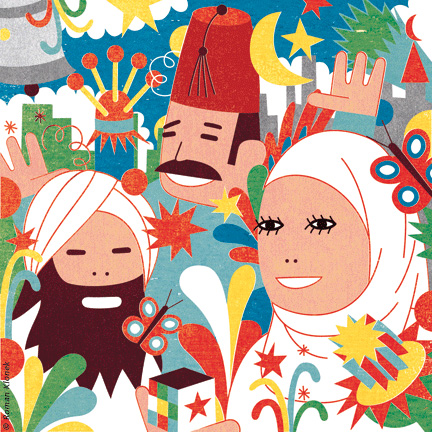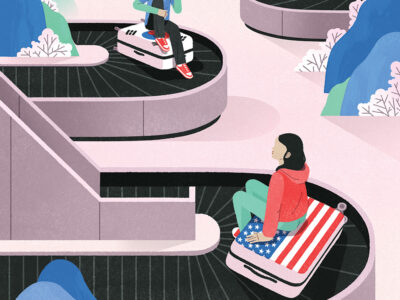
How my year in Morocco highlighted the richness of Islam, Philadelphia-style.
By Emily Goshey
Four women in black headscarves and long black overgarments shuffle past me on their way to Friday prayer. They greet me—Assalamu ‘alaikum—and I greet them back. I’m not Muslim, but I’ve wrapped my hair in a white scarf, and the last thing I want is to reinforce the stereotype that Caucasian Muslims don’t give “salaams” to darker-skinned sisters.
This scenario could have happened in Saudi Arabia, Egypt, Morocco, or any number of Islamic nations. But in my case it played out on 42nd and Walnut streets, right here in West Philadelphia.
I began to take an interest in Islam while tutoring English to foreign students in my high school. The students—from Somalia, Afghanistan, Yemen, Egypt, and Kuwait—claimed that my Christian God was the same as their Muslim God, and that the Prophet Mohammed came not to denounce Jesus but to elaborate upon his message for a new era. Through them my fascination with world religions began, leading me eventually to convert to the Baha’i faith, which recognizes Mohammed as a messenger from God, but also allows that there have been messengers since his time. My initial curiosity about Islam developed into a deep love, and eventually, a formal academic pursuit when I found that I, too, accepted its prophet and its book.
When I came to Philadelphia, I noticed that the Islamic community here consists primarily of African Americans—not the Arabs or South Asians that appear more frequently in my textbooks. As an Islamic studies major, I embarked on an ethnographic exploration of the African American Muslim community of Philadelphia, hoping to gain a better understanding of the University’s surrounding community.
And that’s how I found myself spending a hot, muggy summer day on the edge of the Delaware River with ten thousand of my Muslim neighbors.
For the last 19 years, the Islamic Cultural Preservation and Information Center (ICPIC) has organized an annual Islamic Heritage Festival. I joined the most recent festival behind the scenes, experiencing it alongside several men and many women who managed every last detail, from keeping an eye on the bright-orange donation buckets to ensuring that the vendors sold only legitimately Islamic goods. “Halal lemonade” and “Akbar Juice” became major points of contention, but all in all the team ensured a smooth day.
I knew to expect a diverse group of attendees, but I was astounded by how many groups arrived to assert their presence and connect with their brothers and sisters in Islam.
People from the Moorish Science Temple community were easy to spot—the men in impeccable black suits and red fez hats, the women with white flowing garments and red turbans.
The Association of Islamic Charitable Projects, a large organization comprising Arabs, African Americans, and Caucasians, turned up next. One of their number tried desperately to line up the younger boys into four neat rows, which proved an impossible task because they were entirely preoccupied with the massive drums that the older boys got to beat as the whole group chanted, “I bear witness, I bear witness, that there is no God except Allah!”
Despite the theological controversy surrounding the Ahmadiyya sect of Islam—whose members do not regard Mohammed as the last prophet—their presence at the festival sparked no apparent animosity. The primarily South Asian group held up signs advertising Philadelphia’s Ahmadiyya mosque as two of their members rode a tandem bicycle alongside the parade, handing out fliers.
The Jewels of Islam rode together in several vehicles toward the end of the parade. These women pioneers essentially built the foundations of Philadelphia’s Nation of Islam community, before finding their way to a more orthodox version of the religion beginning in the late 1970s under the guidance of W. Deen Muhammad, a son of the Nation of Islam’s controversial leader, Elijah Muhammad.
But even before the parade began, the primary ICPIC coordinator for the festival had decided that Muslim veterans would be the ones to lead the march eastward along Chestnut Street to Penn’s Landing. “We’ve got to have the veterans lead the parade,” he insisted. “We’re demonstrating that we’re a part of America, too. What’s more American than a veteran?”
Maybe nothing except, perhaps, the food court. Fried chicken, battered shrimp, cornbread, green beans, macaroni and cheese, and hamburgers were just a sampling of the all-American menu. There was not a falafel stand in sight. Performances by Muslim rap artists, official Islamic Heritage Festival T-shirts, and sponsorship by Coca Cola also indicated the thoroughly American nature of the event.
There were other aspects of the festival that took influence from the Arab world. Scented oils, dried dates, and copies of the Qur’an found their way from Saudi Arabia to the tables of vendors in Penn’s Landing. It seems that no matter how American the American Muslims may be, there is something deeply appealing about a perfume made from flowers that grew in the soil where the Prophet Mohammed once walked.
A connection to the land of the Prophet and his original community is something that Muslims throughout the world still seek. And I am now spending a study abroad year in Rabat, Morocco, to learn about Islam within the context of a majority Islamic society. (Of course, a year of eating couscous and relaxing on the Atlantic Ocean didn’t sound so bad either.)
But now that I am actually here in the Arab-Muslim world, I am often surprised by how much Islam simply blends into the background.
In any given conversation between Moroccans, both parties invoke the name of God almost incessantly. The response to Kif dayir? (How are you?) is Alhamdulillah (praise be to God). The word shukran (thank you) is employed far less often than rabbiy ykhalik (may my Lord keep you well) or barak allahu fik (the blessings of God be upon you). But even in a conversation that consists almost entirely of such invocations, it rarely seems that either party has actively considered the religious sentiment of their words—just as the exclamation Oh my God carries no spiritual connotation in English.
Furthermore, Islamic identity in Morocco is clouded by the fact of its imposition on citizens by the state. With the exception of a minuscule Jewish minority, the state considers all Moroccan citizens to be Muslim. It is not an option for someone born Muslim in Morocco to officially choose another faith at any point in his or her life. So it’s not all that surprising that few of the Moroccans I know find much meaning in their Islamic identity.
In Philadelphia, by contrast, Muslims go out of their way to assert just that. With pork in school lunches and no prayer rooms in office buildings, simply obeying the basic dos and don’ts of Islam is a daily challenge. This is why they hold festivals—to celebrate their shared belief in Islam and assert their place in the mosaic of diverse American religious communities.
The formal elements of Islam are more pervasive in Morocco, where calls to prayer are chanted on loudspeakers across the nation five times daily and King Mohammed VI’s performance of Friday prayer reaches homes via live broadcasts. However, it is precisely the fact of Islam’s rarity in America, combined with each citizen’s freedom to choose his or her religious identity, that encourages Muslims to take a personal interest in their faith, build their social networks around it, and choose the ways in which Islam shapes their lives.
I never expected that traveling to an Islamic country would make me miss the passion and enthusiasm for Islam that I witnessed back home, but I suppose that Islam, like any other religion or ideology, tends to flourish in an environment in which people are just as free to reject it as they are to embrace it. This year abroad has helped me to appreciate the religious freedom that I, the Muslims of Philadelphia, and all other Americans enjoy.
Emily Goshey is a College junior from Eagan, Minnesota.




